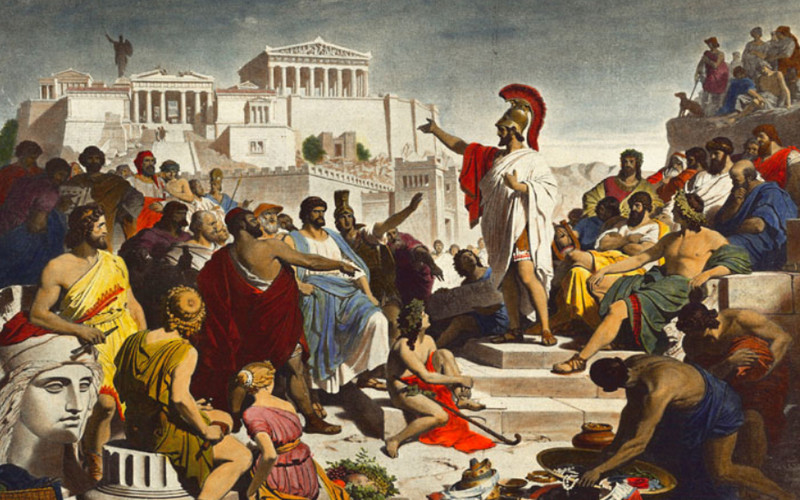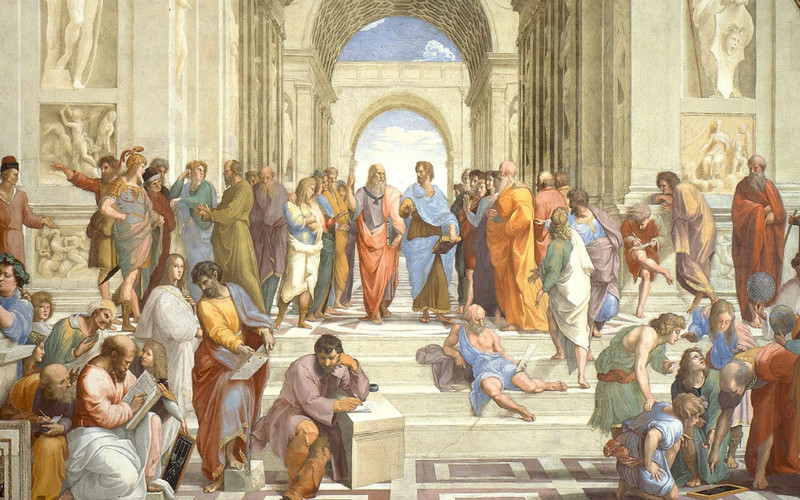The literature of Greece began with long epic poems, predictions of war, and adventure which established the relationship of the ancient Greeks to their gods. The tragedy and comedy, history, and philosophical dialogues of the 5th and 4th centuries BC became the basis of Western literature. Much of our knowledge of the Greeks come from Greek literature.
EPIC POETRY
As far back as the 2nd millennium BC, before even the building of the Mycenaean palaces, poets were telling the stories of the Greek heroes and gods. Passed on from generation to generation, these poems, called rhapsodes, were never written down but were changed and reformed by successive poets.
The oral tradition culminated in the Iliad and Odyssey, which were created around 700 BC. Both works are traditionally attributed to the same poet, Homer, whose life nothing reliable is known. Hesiod, whose most famous poems include the Theogony, also known as the history of the gods, and the Works and Days, on how to live an honest life, also lived around 700 BC. Unlike Homer, Hesiod is thought to have written down his poems, although there is no solid evidence available to justify this theory.

For private occasions and especially to entertain guests at the cultivated drinking parties known as symposia, shorter poetic forms were developed. These poems were often full of passion, be it love or hatred. They could also be personal or, often, highly political. Much of this poetry, written by Archilochus, Alcaeus, Alcman, Hipponax, and Sappho, survived only in quotations by later writers or on scraps of papyrus that have been preserved by chance from private libraries in Hellenistic and Roman Egypt.Through these fragments, we can get a glimpse of the life of a very competitive elite. Since symposia was an almost exclusively male domain, there is a strong element of misogyny in much of this poetry. On the other hand, the fragments of poems discovered by the poet Sappho, who lived on the island of Lesvos, are exceptional for showing a woman competing in a literary area in a male-dominated society like ancient Greece and for describing with great intensity her passions for other women.
HISTORY
Until the 5th century BC not many works from Greek literature were composed in prose- even early philosophy was in verse. In the latter part of the 5th century, a new tradition of lengthy prose histories, looking at recent or current events, was established with Herodotus; an account of the great war between Greece and Persia (490- 479 BC). Herodotus put the clash between Greeks and Persians into context and included an ethnographic account of the vast Persian Empire.
He tried to record objectively what people said about the past. Thucydides took a narrower view in his account of the long years of the Peloponnesian war between Athens and Sparta (431- 404 BC). He concentrated on political history and his goal was to work out the “truth” that lay behind the events of the war. The methods of Thucydides were adopted by later writers of Greek history, though few could match his acute insight into human nature.
ORATORY
The public argument was essential for Greek political life even in the Archaic period. In the later part of the 5th century BC, the techniques of persuasive speech began to be studied more seriously. From that time on some orators began publishing their speeches. More specifically, this included those wishing to advertise their skills in composing speeches for the law courts, such as Lysias and Demosthenes.
The texts that survive give insights into both Athenian politics and the vile side of Athenian private life. The verbal attacks on Philip of Macedon by Demosthenes, the 4th century BC Athenian politician, became models for Roman politicians who were seeking to defeat their opponents. With the 18th-century European revival of interest in Classical times, Demosthenes again became a role model, especially in politics.

Almost all the surviving tragedies that we have today, come from the hands of the three great 5th-century BC Athenians: Aeschylus, Sophocles, and Euripides. The latter two playwrights developed an interest in individual psychology (for example in Euripides’ Medea). While 5th-century comedy is full of direct references to contemporary life and dirty jokes, the “new” comedy developed in the 4th century BC is essentially situation comedy with lots of character types involved.
GREEK PHILOSOPHERS
Socrates, who was an Athenian, was recognized in the late 5th century BC as a moral arbiter. He himself did not write anything but we know about his views through the “Socratic dialogues”, written by his student, Plato, examining the concepts of justice, virtue, and courage. Plato founded his academy in the suburbs of Athens. His pupil Aristotle founded the Lyceum, to teach subjects from biology to ethics and helped turn Athens into one of the first university cities. Between 1508-11, Raphael painted this vision of Athens in the Vatican.






